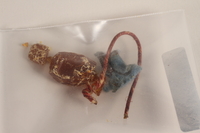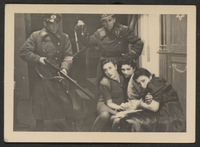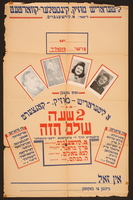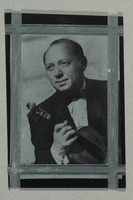Overview
- Brief Narrative
- Towel used by 35 year old Perec Brandt, embroidered with his prisoner number, 82321/23, for Buchenwald concentration camp where he was imprisoned from 1943-1945. Perec was the concertmaster of the Riga Latvian Symphony Orchestra in 1940 when the Soviets annexed Latvia. In June 1941, Latvia was under German occupation and Perec’s wife, daughter, and son were murdered by the SS Einsatzgruppen [mobile killing unit]. Perec was forced into the Riga ghetto, and later transferred to Riga-Kaiserwald, Stutthof, and Buchenwald concentration camps. In Buchenwald, he was ordered to play his violin for the commandant and was rewarded with extra rations. He kept his violin with him throughout his imprisonment and even slept with it. He was liberated from Buchenwald on April 11, 1945, by the United States Army. Perec weighed 50 pounds at liberation. He joined the Kibbutz Buchenwald, part of a displaced persons camp. Postwar, he performed with his violin in various DP camps where he met and married Grunia Lewin (later Gertrude), a survivor of Dondangen II, Stutthof, and Mühldorf concentration camps. They immigrated to the United States in February 1949.
- Date
-
use:
1944 August 16-1945 April 11
- Geography
-
issue:
Buchenwald (Concentration camp);
Weimar (Thuringia, Germany)
- Credit Line
- United States Holocaust Memorial Museum Collection, Gift of Gertrude Brand
- Contributor
-
Subject:
Gertrude Brand
Percy Brand
- Biography
-
Grunia Lewin (later Gertrude Levine Brand) was born on October 1, 1919, in Liepāja, Latvia, to a Jewish couple, Aron David and Lisa Chrapkowska Lewin. She worked as an apothecary, chemist, and farmer. She was married to Elias Leo Hirshman. The Soviet Union occupied Latvia in June 1940. In spring 1941, Germany invaded the Soviet Union and, by July 1941, the country was occupied by German forces. On July 1, 1942, Grunia was forced into the newly formed ghetto in Liepāja. In August, the ghetto was closed off from the rest of the city. On May 5, 1943, Grunia was arrested by the German Security Police (Sipo). On September 3, Grunia was transported to Dondangen II (Poperwahlen) forced labor camp, a sub-camp of Riga-Kaiserwald concentration camp. In early July, as the Soviets advanced, the camp was evacuated and Grunia was transported to Dondangen I. In late July, the Sipo running the camp closed it, and on August 9, 1944, they sent many prisoners, including Grunia, to Stutthof concentration camp, near the German occupied city of Danzig. Upon arrival, she was assigned prisoner number 57127. On August 22, she was transferred to Mühldorf concentration camp, a sub-camp of Dachau concentration camp. She was assigned prisoner number 92894 and was likely put to work as a forced laborer at an underground airplane factory code-named Weingut I. Grunia’s husband, Elias, Leo was deported to Dachau, where he was murdered.
Grunia was liberated on May 1, 1945. Following Germany’s May 7 surrender, Grunia traveled to a displaced persons camp in Feldafing, Germany. In 1947, she attended a concert in Frankfurt, Germany, given by Perec Brandt, a musician from Liepāja. Perec had lost his wife and two children during the war and survived Riga-Kaiserwald, Stutthof, and Buchenwald concentration camps by playing his violin to appease the guards and earn extra food. The two met at his performance, soon married, and Grunia went to live with him in the Zeilsheim DP camp. Grunia became his manager as he performed in many DP camps. Grunia later learned that her mother, Lisa, was transported to a camp near Riga when the Liepāja ghetto was liquidated in October 1943. In October 1944, Lisa was likely deported to Stutthof concentration camp, where she perished before the war ended. Grunia’s great uncle, Harry Marcus, agreed to sponsor the couple, and in February 1949, they immigrated to the United States aboard the SS Marine Jumper. They settled in Boston, Massachusetts, where Grunia changed her name to Gertrude and Perec to Percy Brand. Gertrude continued to manage Percy’s successful career as a well-known musician and radio and television performer. Percy, age 77, died on August 8, 1985, in Brookline, Massachusetts. Gertrude, age 89, died on November 27, 2008, in Brookline.
Perec Brandt (later Percy Brand) was born on April 2, 1908, in Liepāja, Latvia, to a Jewish couple, Abram and Basia Brandt. He had one sister named Mary, and at least one brother, Carpel. He began playing the violin at the age of ten. He married Sara Behrmann and they had two children, Judith Basya, born on November 22, 1930, and Mendel, born on August 8, 1933. The family lived in Riga, where Perec was the concertmaster of the Riga Latvian Symphony Orchestra.
In August 1940, the Soviet Union annexed Latvia. In spring 1941, Germany attacked the Soviet Union and, by July 1941, Riga was occupied by German forces. SS Einsatzgruppen units [mobile killing units], assisted by the local population, rounded up and shot thousands of Jewish Latvians who were unable to work, especially children, women with small children, the elderly, and the ill. Perec’s wife and children were among those taken and murdered. Perec was forced into labor, stripped of his possessions, except his violin, and moved into the Riga ghetto, which was sealed soon after. Later, Perec met and married a Czechoslovakian woman named Margit Stransky Rekler, who had been deported from Vienna, Austria, to Riga in January 1942. In August 1943, he was sent to Riga-Kaiserwald concentration camp. In October, Perec was deported to Stutthof concentration camp near the German occupied city of Danzig. On August 16, 1944, he was transported to Buchenwald concentration camp in Germany, where he was assigned prisoner number 82321. Perec kept his violin with him during the transports, and in each camp it was confiscated and then returned to him. In Buchenwald, the commandant summoned him daily to play for him and rewarded him with bread, meat, and coffee. From late November 1944 to early January 1945, Perec was very sick and needed to be hospitalized. On April 11, 1945, the 6th Armored Division of the US Army marched into Buchenwald, several hours after the prisoners took control by storming the guard towers and forcing the guards to flee. Perec weighed 50 pounds at liberation.
On May 7, Germany surrendered. In June, Perec joined the Kibbutz Buchenwald, a training farm affiliated with a nearby displaced persons camp in Fulda, Germany, which was preparing survivors for immigration to Palestine. Perec later learned that in August 1944, Margit had been deported to Stutthof and Sophienwalde concentration camps near Danzig, where she perished. Perec regularly performed for survivors in various displaced persons camps. In January 1946, he went to the Zeilsheim DP camp. In 1947, he became the first musician to play Jewish and Hebrew music on the Frankfurt am Main radio. At this performance he met Grunia Lewin (Levine, 1919 – 2008) who was also from Liepāja, and a survivor of Dondangen II, Stutthof, and Mühldorf concentration camps. They married and she went to live with him in the Zeilsheim DP camp. Grunia became his manager as he performed in many DP camps. Gertrude’s great uncle, Harry Marcus, agreed to sponsor the couple, and in February 1949, they immigrated to the United States aboard the SS Marine Jumper. They settled in Boston, Massachusetts, where Grunia changed her name to Gertrude and Perec to Percy Brand. Percy had a successful career as a well-known musician and radio and television performer. Gertrude continued to serve as his manager. Percy, age 77, died on August 8, 1985, in Brookline, Massachusetts.
Physical Details
- Classification
-
Furnishings and Furniture
- Category
-
Household linens
- Object Type
-
Bath towels (lcsh)
- Physical Description
- Rectangular, thin, worn, white cloth towel with faded, narrow, red vertical and yellow horizontal lines and frayed ends. A number is stitched in gray thread along the bottom edge.
- Dimensions
- overall: Height: 44.625 inches (113.348 cm) | Width: 14.000 inches (35.56 cm)
- Materials
- overall : cloth, thread
- Inscription
- bottom edge, embroidered, gray thread : 82321/23
Rights & Restrictions
- Conditions on Access
- No restrictions on access
- Conditions on Use
- No restrictions on use
Keywords & Subjects
Administrative Notes
- Legal Status
- Permanent Collection
- Provenance
- The towel was donated to the United States Holocaust Memorial Museum in 2006 by Gertrude Brand, the widow of Percy Brand.
- Record last modified:
- 2022-08-03 09:32:40
- This page:
- https://collections.ushmm.org/search/catalog/irn45083
Also in Percy Brand collection
The collection consists of artifacts, audiocassettes, documents, and a scrapbook related to the experiences of Perec Brandt (Percy Brand) in Latvia and in several concentration camps and displaced persons camps after the Holocaust, as well as his postwar musical career.
Date: 1920-1985

Violin, case and spare parts used by a Jewish Latvian musician while imprisoned in several concentration camps
Object
Violin, case, and parts kept by Perec Brandt during his imprisonment in several concentration camps from 1943-1945. A family friend gave the violin to Perec as a Bar Mitzvah present in 1921. Perec was the concertmaster of the Riga Latvian Symphony Orchestra in 1940 when the Soviets annexed Latvia. In June 1941, Latvia was under German occupation and Perec’s wife, daughter, and son were murdered by the SS Einsatzgruppen [mobile killing unit]. Perec was forced into the Riga ghetto, and later transferred to Riga-Kaiserwald, Stutthof, and Buchenwald concentration camps. In Buchenwald, he was ordered to play his violin for the commandant and was rewarded with extra rations. He kept his violin with him throughout his imprisonment and even slept with it. He was liberated from Buchenwald on April 11, 1945, by the United States Army. Perec weighed 50 pounds at liberation. He joined the Kibbutz Buchenwald, part of a displaced persons camp. Postwar, he performed with his violin in various DP camps where he met and married Grunia Lewin (later Gertrude), a survivor of Dondangen II, Stutthof, and Mühldorf concentration camps. They immigrated to the United States in February 1949.

Percy Brand papers
Document
The collection documents the life and musical career of Percy (Perec) Brand, a violinist originally from Liepāja, Latvia, who was imprisoned in the Kaiserwald, Stutthof, and Buchenwald concentration camps during the Holocaust. The material primarily relates to his post-war life in the Kibbutz Buchenwald and Zeilsheim displaced persons camps, as well as his musical career in Roxbury, Massachusetts. Included are biographical materials, sheet music, programs, photographs, and audio recordings. The biographical material includes an address book, clippings, a small amount of correspondence, his obituary, and a scrapbook of his career. The sheet music consists of printed and handwritten scores. It is likely that the bulk if not all of the printed sheet music are previously published compositions. The programs include events performed in post-war Germany and the United States. Also included are publicity materials. The photographs include depictions of pre and post-war family members, Zeilsheim, Percy and his wife Gertrude, and Percy’s performances. The photograph albums primarily document Percy’s life in the DP camps. The audio recordings consist of audio cassettes of Percy’s performances. Some appear to recorded radio broadcasts also featuring Ben Gailing, a contemporary of Percy.

Poster for a literary music concert in a displaced persons camp saved by a Jewish Latvian musician
Object
Advertising poster for a literary music concert saved by Perec Brandt (later Percy Brand) while he was living in and performing at a displaced persons camp in Germany from 1945 to 1949. The poster features the photographs of the four Yiddish quartet members, including Perec holding his violin, and lists the works selected for the concert program. Perec was the concertmaster of the Riga Latvian Symphony Orchestra in 1940 when the Soviets annexed Latvia. In June 1941, Latvia was under German occupation and Perec’s wife, daughter, and son were murdered by the SS Einsatzgruppen [mobile killing unit]. Perec was forced into the Riga ghetto, and later transferred to Riga-Kaiserwald, Stutthof, and Buchenwald concentration camps. In Buchenwald, he was ordered to play his violin for the commandant and was rewarded with extra rations. He kept his violin with him throughout his imprisonment and even slept with it. He was liberated from Buchenwald on April 11, 1945, by the United States Army. Perec weighed 50 pounds at liberation. He joined the Kibbutz Buchenwald, part of a displaced persons camp. Postwar, he performed with his violin in various DP camps where he met and married Grunia Lewin (later Gertrude), a survivor of Dondangen II, Stutthof, and Mühldorf concentration camps. They immigrated to the United States in February 1949.

Offset lithographic printing plate depicting Percy Brand holding his violin
Object
Tinted, offset lithographic, metal printing plate with a photograph of Perec Brandt (later Percy Brand) holding his violin (2006.133.2a-j), the same one used while a concentration camp inmate in Latvia and Germany from 1941 to 1945 and a displaced person in Germany from 1945 to 1949. Perec was the concertmaster of the Riga Latvian Symphony Orchestra in 1940 when the Soviets annexed Latvia. In June 1941, Latvia was under German occupation and Perec’s wife, daughter, and son were murdered by the SS Einsatzgruppen [mobile killing unit]. Perec was forced into the Riga ghetto, and later transferred to Riga-Kaiserwald, Stutthof, and Buchenwald concentration camps. In Buchenwald, he was ordered to play his violin for the commandant and was rewarded with extra rations. He kept his violin with him throughout his imprisonment and even slept with it. He was liberated from Buchenwald on April 11, 1945, by the United States Army. Perec weighed 50 pounds at liberation. He joined the Kibbutz Buchenwald, part of a displaced persons camp. Postwar, he performed with his violin in various DP camps where he met and married Grunia Lewin (later Gertrude), a survivor of Dondangen II, Stutthof, and Mühldorf concentration camps. They immigrated to the United States in February 1949.



